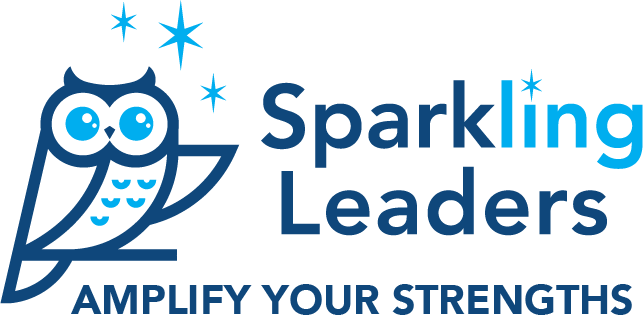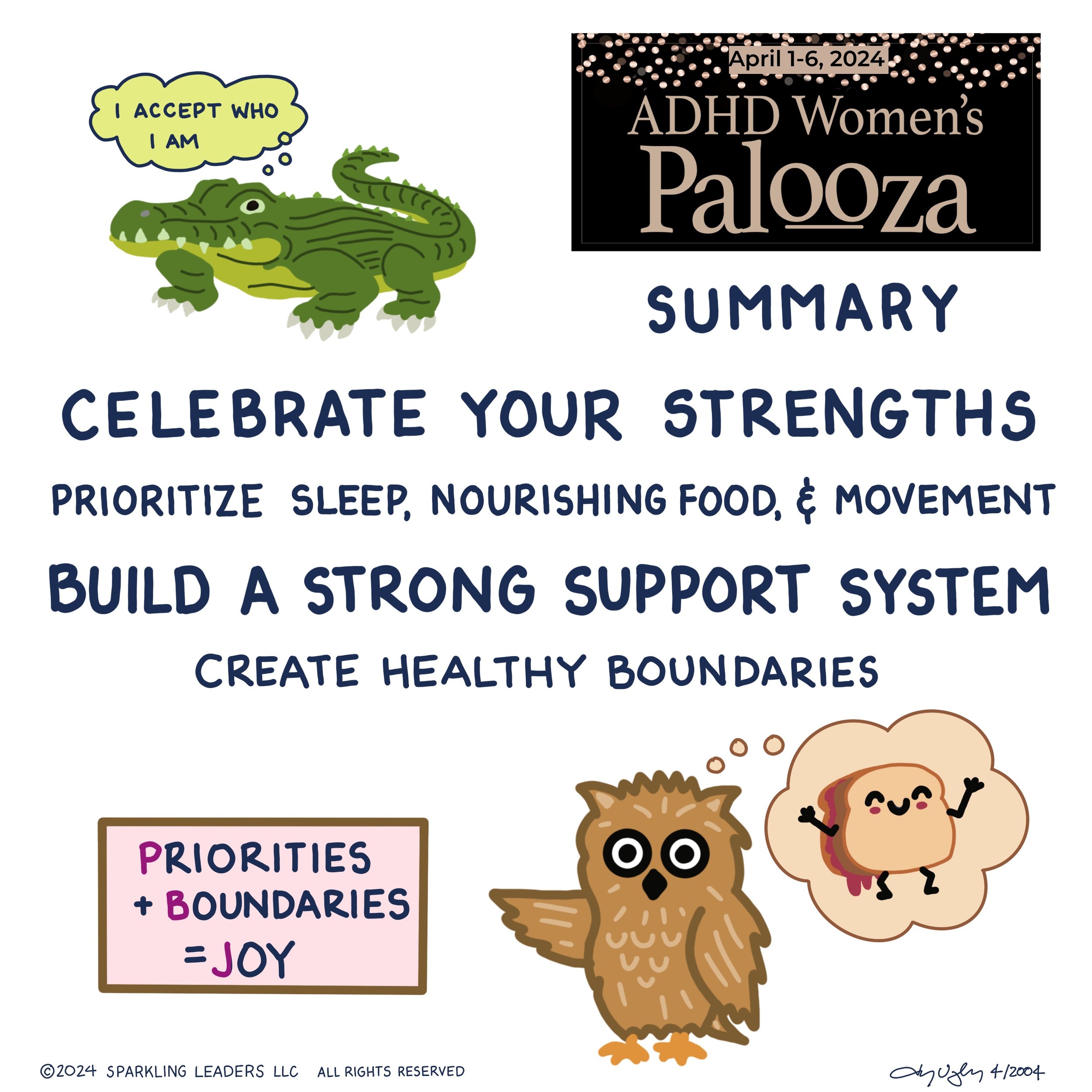ADHD Women’s Palooza Summary
I attended the ADHD Women’s Palooza from Apr 1 to 6 this year opting for the free version where we had about 27 hours of access to each day of content. I listened to about 25 of the recordings and have been processing my learnings over the past week. It was very reaffirming. Many of the speakers repeated common themes about accepting that ADHD is a thing, that it affects how your brain works, and how you can find systems and supports to help you. Below is a summary of the sessions I attended.
Top Ten Takeaways
Accept who you are.
Celebrate your strengths.
Give yourself the validation you need.
Prioritize sleep, healthy food, and movement.
Have a strong support system.
Figure out the systems/tools you need.
Create healthy boundaries. Think PB&J: Priorities + Boundaries = Joy
Recognize and find ways to heal from shame.
No one can be all things to all people.
Change your self-talk to be more supportive.
Top Reflections
What types of cognitive ergonomics, systems, supports, etc, do you need to be your best self?
Where do the expectations you think you need to live up to come from?
What obstacles do you encounter in trying to complete different tasks/projects? How can you make the obstacles easier to overcome? How can you make the tasks/projects more fun?
Can you think about What Could Go Wrong during your day and proactively figure out corrective actions? Ex: Bad things will happen if you are late so don’t sneak “a quick” task in before you leave.
How can you give yourself the approval you need? What can you do to increase your self-confidence, acceptance, and self-love every day?
When do you have the most energy? Can you figure out how much energy different tasks will take and try to plan your day accordingly? (From a previous book - before you schedule something, look at your calendar and figure out if you will have the energy for it, not just the time for it).
Figure out your values and goals. Ask yourself if the thing you are about to say, think, or do is going to get you to that goal.
Are you procrastin-eating or using food for stimulation? Can you move your body or find another way to increase your dopamine?
Whose standards are you trying to live up to? Are there alternate ways to do things that work better for you?
How good is good enough? At what point is it not worth it to get better?
Top Tips and Thoughts
Surround yourself with people who support your strengths.
Shame can come from equating intelligence with executive functioning.
Q-TIP: Quit Taking It Personally
Try to be curious, not furious when facing difficult situations.
Instead of dissecting every negative thought, pause and check in with your body (feel your feet, breathe, or do an exercise like 54321).
Clutter hurts. Avoid executive dread (not wanting to get rid of something you might later need) by asking, When was the last time I used it? What is the utility? Am I just holding on to it?
Be aware of and try to avoid the 3 P’s Loop of Perfectionism, Procrastination, and Paralysis.
Relationships require more than just reaching out. When you have communication issues, strengthen your relationships by reaching out, discussing the repair, and then finding ways to reconnect.
Many people with ADHD feel things more strongly. Give yourself the space to feel your feelings so you can move on.
Diabetes is common for people with ADHD. If you want to improve your blood sugar, focus on regular meals (every 3 to 4 hours), exercise (any type of movement), and healthy foods with fiber, fat, and protein.
Due to poor interoception, we are not always aware of hunger until our bodies are screaming. Try to eat carbs, proteins, and fats consistently throughout the day to avoid overeating.
Stress has a huge impact on the body. Prioritize your sleep. Lack of sleep can lead to higher stress and higher stress can lead to higher blood sugar.
When we try to cut things out like carbs, we give them more power and gain more dopamine when we eat them. Permit yourself to eat carbs mindfully. Eat every 3-4 hours. Make a list of easy meals - whatever works for you.
People with ADHD are more likely to have experienced acute and/or chronic trauma because of how we process, if you feel you experienced trauma, you did. Without our prefrontal cortex protecting us, things can feel more can feel traumatic.
Women are more likely to freeze and fawn, which others may not see as a trauma response.
Grief reopens old doors to grief. To help manage grief and loss, speak your feelings out loud or journal if it helps. Change your self-talk, recognize and figure out how to handle the triggers, and practice sitting with it.
Grief doesn’t just go away. Acknowledge it, ride the wave and be patient with yourself. You deserve the time and space to grieve in your own way.
Therapists who don’t understand neurodivergence often shame their clients. This spoke to me from previous experience with several therapists.
It’s okay to not be your best self every moment. Life is the struggle, be your best self.
You are who you are meant to be, all the challenges were meant to be to make you who you are.
Book suggestions:
Handwriting Brain-Body DisConnect: Adaptive teaching techniques to unlock a child’s dysgraphia for the classroom and at home by Cheri L Dotterer (Mar 2019)
Organizing solutions for people with ADHD by Susan Pinsky (May 2023)
ADHD Friendly ways to organize your life by Judith Kolberg and Kathleen Nadeau (Sep 2016)
How to Keep House While Drowning: Strategies that Work from an Acclaimed Professional Organizer and a Renowned ADD Clinician A Gentle Approach to Cleaning and Organizing by KC Davis LPC (Apr 2022) - Loved this!
How to ADHD: An Insider's Guide to Working with Your Brain (Not Against It) by Jessica McCabe (Jan 2024)
ADHD for Smart Ass Women: How to Fall in Love with Your Neurodivergent Brain, Tracy Otsuka (Dec 2023)
ADHD 2.0: New Science and Essential Strategies for Thriving with Distraction--from Childhood through Adulthood by Edward M. Hallowell M.D. and John J. Ratey M.D. (Jan 2022)
Smart but Stuck: Emotions in Teens and Adults with ADHD by Thomas E. Brown (Jul 2020 Audio only)
Outside the Box: Rethinking Add/Adhd in Children and Adults - a Practical Guide by Thomas E Brown PH.D. (Apr 2017) said expensive but really worth it
ADHD and Asperger Syndrome in Smart Kids and Adults: Twelve Stories of Struggle, Support, and Treatment by Thomas E. Brown (Aug 2021)
Additional Resources:
How to ADHD (Jessica, very cute and accessible - also has a book)
CHADD Children and Adults with Attention-Deficit/Hyperactivity Disorder
Additude magazine
ADHD for Smartass Women (podcast - also has a book)
ADHD focus (David Pomeroy)
Dr Brown’s books (read the most recent)
ADHD Women’s Palooza Agenda
Link to conference information to purchase recordings.
Monday, Apr 1
ADHD in Older Adults: It's time to pay attention! DAVID W. GOODMAN, M.D.
Overcoming the ADHD Approval Trap SHARON SALINE, PSY.D.
Your ADHD Ally Can Make or Break Your Success at Work! STACEY MACHELLE
Coaching Yourself Through ADHD — Sage Advice From Top ADHD Coaches ELAINE TAYLOR-KLAUS, PCC AND DIANE DEMPSTER, CPC, PCC, MHSA
Fitting the Task to Your Brain: A New Intervention for ADHD JEFF COPPER, MBA, PCC, PCAC, CPCC
Leaning Into Our Energy, Passion and Fulfillment After a Late-In-Life ADHD Diagnosis KATE MORYOUSSEF
AIRS TUESDAY, APRIL 2, 2024 @ 9:00 AM EDT
Unmasking Your Gremlins: Managing Your Negative Thoughts MINDY SCHWARTZ KATZ, LCSW
ADHD, Clutter and Hoarding ROBERTO OLIVARDIA, PH.D
Throw The Made Up Rules In The Trash! PATRICIA SUNG
Unraveling the Tapestry of Generational ADHD LAURIE DUPAR, MSN, RN, PCC, CALC
FINALLY! An ADHD Center for Girls and Women that Encourages Research! JULIA C. SCHECHTER, PHD
How To Use ChatGPT To Skyrocket ADHD Productivity and Executive Function BOB DIETRICH
AIRS WEDNESDAY, APRIL 3, 2024 @ 9:00 AM EDT
Fibromyalgia, Overlapping Chronic Pain Syndromes, and ADHD MICHAEL LENZ, M.D.
ADHD, Dysgraphia and Why is My Handwriting So Bad? CHERI DOTTERER, MS, OTR/L
The Paradoxes of High Achieving and Executive ADHD Women FARAH JAMIL, MHA, CEC, ACC
2023 State of Women and ADHD Town Hall: Results MICHELLE HARRIS PRICE
6 Small and Easy Mini-Systems that Get BIG Results ALAN P. BROWN
“Tummy Time” et al Could Connect the Gaps in Your ADHD Brain! ALMA GALVAN
AIRS THURSDAY, APRIL 4, 2024 @ 9:00 AM EDT
Identifying the Glass Balls: The Art of Juggling a Startup with Three ADHD Co-Founders ADI DINER, PH.D.
ADHD Basics: the Tripod Approach to Living Your Best ADHD Life DAVID P. POMEROY, M.D.
ADHD Stigmas, Myths, and Plain Ol' Lies: Let's Get it Straight TERRY MATLEN, LMSW, ACSW
Neurodiversity in the Workplace - Inclusive Practices to Reach Full Potential CHARLOTTE HUGHES MS, CDP, SHRBP, CPLP
ADHD and Trauma: What is EMDR for ADHD? NOELLE LYNN, LMSW, ADHD-CCPS
How to Advocate for What you Need as a 2e Adult in the Workplace JULIE F. SKOLNICK, M.A., J.D.
AIRS FRIDAY, APRIL 5, 2024 @ 9:00 AM EDT
Should You Change It or Accept It? ARI TUCKMAN, PSY.D.
Neuronormativity and Neuroqueering PASHA MARLOWE, MFT
Hate Conflict? Untangle it with the Three Rs of ADHD Relationships TAMARA ROSIER, PH.D.
The ADHD Diabetes Connection NICOLE DEMASI MALCHER, MS, RDN, CDCES
Your ADHD Menopause Journey LINDA ROGGLI
Managing Stages of Grief with an ADHD Perspective JODI SLEEPER-TRIPLETT, MCC, SCAC, BCC
Motivation Hacks: Innovative Strategies for Inattentive ADHD Brains ARON CROFT M.S.

